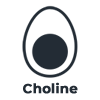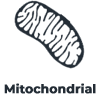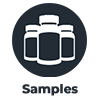Not every form of choline readily makes it into the brain. However, Cognizin Citicoline has been found to rapidly make its way into the brain after supplementation. Once in the brain, choline itself can act on a very important cholinergic receptor: the alpha-7 nicotinic acetylcholine receptor. This is one of the main cholinergic receptors involved with cognitive function, and activation of this receptor has been shown to lead to fairly profound cognitive support. Furthermore, the choline from Cognizin Citicoline is rapidly converted to acetylcholine. You can learn more about this process below.
What sets Cognizin Citicoline apart from other choline sources is its unique composition. Citicoline consists of phosphocholine and cytidine. Upon consumption, the phosphocholine and cytidine separate and the cytidine promptly turns into uridine. Uridine is a unique molecule that interacts with both the cholinergic and dopaminergic systems of the brain. Phosphocholine is also unique, in that it helps with the synthesis of a molecule called phosphatidylcholine, which is an important component of neuronal membranes. Therefore, supplementation of Cognizin Citicoline not only supports brain function with readily available choline, it also supplies it with uridine and phosphocholine which all have additive benefits in terms of overall brain health and cognition.
To learn more about Cognizin Citicoline research, see the infographic below.











